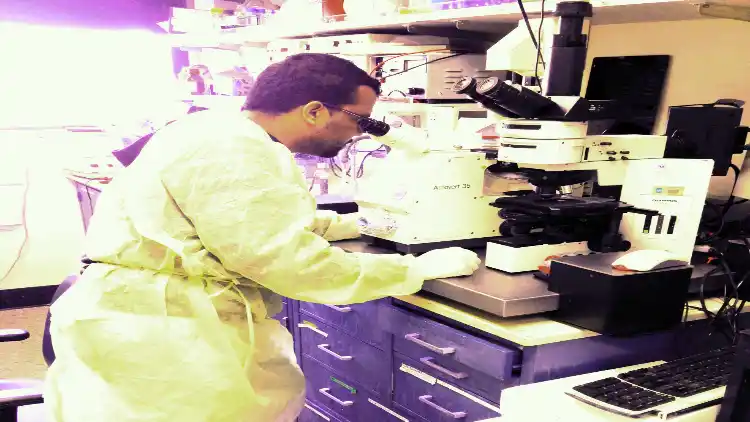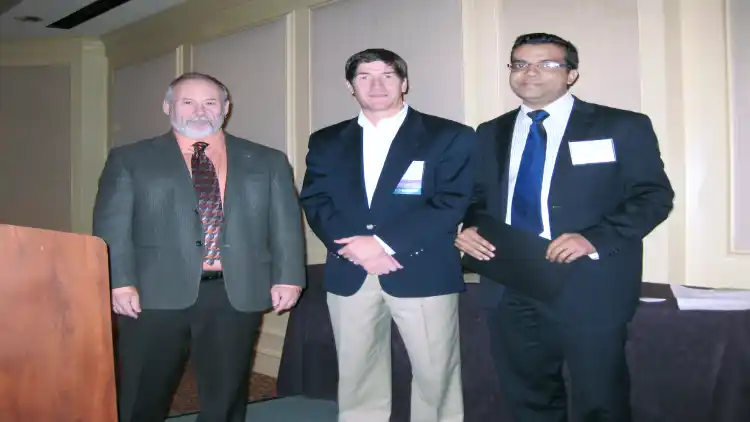.webp)
Daulat Rahman/Guwahati
A personal tragedy became a motivation for Dr Hifzur Rahman Siddique, Faculty, Aligarh Muslim University to discover the treatment of liver cancer disease.
Today, his findings of the research have evoked hope in the medical fraternity to treat the once fatal disease. "My father Moyeen Uddin Siddique died of cancer; my mother Asthorun Nessa Choudhury lost her battle against liver cancer.
Deaths of my parents had become a challenge for me to find the exact causes of liver cancer," Dr Siddique who hails from Assam told Awaz-The Voice. He was recently selected as one of the members of the prestigious National Academy of Sciences, India (NASI).
Dr Siddique’s research done in association with Prof Keigo Machida of the University of Southern California, Los Angeles, and other collaborators have discovered that the protein-forming cancerous cells in the human body cause the growth of tumors in the liver. Excess alcohol consumption or Hepatitis infection results in the formation of these malignant cells in the human body.

Dr Hafizur Rahman Siddique in his laboratory
He says his findings could serve as a cue for the drug design and better management strategy of liver cancer. The study of Dr Siddique was recently published in the prestigious journal, 'Nature Communications 11' (2020). The journal has editorial offices in London, Berlin, New York City, and Shanghai.
"Our research has mapped the molecular mechanisms of the cancer-causing protein, TBC1D15. Cancer cells and Cancer Stem Cells accumulate TBC1D15, which aggravates the disease," he said. Dr Hifzur originally hails from a remote village in the Karimganj district. He has established a dedicated laboratory and done pioneer research on Cancer Stem Cells at the AMU.
In his published work, he explained that alcohol consumption and Hepatitis infection leads to liver cancer formation through stem cell factor and the generation of Cancer Stem Cells. Dr. Siddique, faculty at the Zoology Department, AMU, said the higher incidence of liver cancer – 80-83% - if found in developing and underdeveloped countries. Risk factors for the disease are alcohol consumption and Hepatitis Virus infection. Excess alcohol consumption causes cirrhosis that leads to liver cancer, he said Dr. Siddique's earlier research projects had also earned accolades.
He got the Young Scientist Award-2010 from the Society of Basic Urologic Research, USA, Farha Deba award from the Indian Academy of Bio-Medical Sciences in 2017, Innovative Researcher of the Year in Bangkok from the Society of Pharmaceutical Education and Research in 2019.

Dr Hafiz Rahman Siddique with Foreign scienctists
He says his findings could serve as a cue for the drug design and better management strategy of liver cancer. The study of Dr Siddique was recently published in the prestigious journal, 'Nature Communications 11' (2020). The journal has editorial offices in London, Berlin, New York City, and Shanghai.
He got the Young Scientist Award-2010 from the Society of Basic Urologic Research, USA, Farha Deba award from the Indian Academy of Bio-Medical Sciences in 2017, Innovative Researcher of the Year in Bangkok from the Society of Pharmaceutical Education and Research in 2019.
His publications were highlighted by the US and Indian print and electronic media such as New York Times, Wall Street Journal, The Street. In 2014, his work on therapy-resistant cancer was selected as one of the three "Featured Prostate Cancer Research" works by the USA Department of Defense's "2014 Research Highlights" section.
